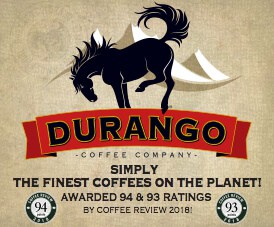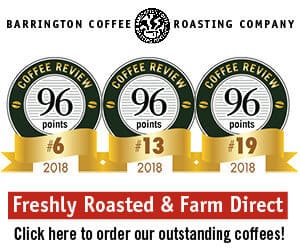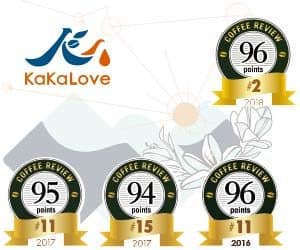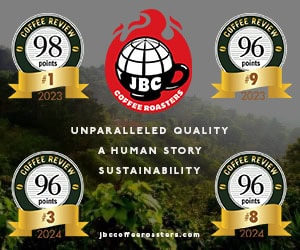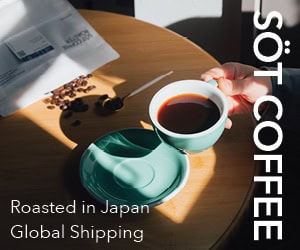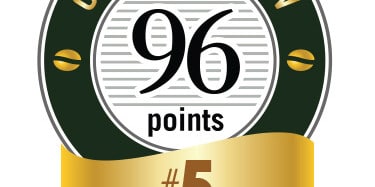Produced by a cooperative of 1,300 small-holding farmers in Huehuetenango, Guatemala. This coffee is certified organically grown and certified fair trade, the latter meaning it was purchased at no less than a minimum price determined by the certifying agency to be economically sustainable for the farmers. Paradise Roasters specializes in micro-lot Arabica and Robusta coffees from Asia and other
SEARCH RESULTS
Ecuador Pichincha Typica
This exceptional coffee was selected as the No. 28 coffee on Coffee Review’s list of the Top 30 Coffees of 2018. This coffee tied for the third-highest rating in a cupping of coffees roasted by women for Coffee Review‘s April 2018 tasting report. Produced entirely from the Typica Mejorado variety of Arabica in the Pichincha region of Ecuador, bordering Colombia. Paradise Roasters specializes in
Ethiopia Suke Quto Honey
Produced entirely from trees of the Kurume and Welicho varieties of Arabica at Suke Quto farm. Processed by the honey method, which means that the outer skin of the coffee fruit is removed, as it is in the wet or “washed” process, but at least some of the sticky fruit residue is allowed to dry on the bean and later removed by machine along with the parchment skin. This coffee is both organic- and
Espresso Classico
This blend is unusual in the context of leading-edge small North American roasting companies, because it contains a significant percentage of coffee of the Robusta species, in this case a speciality Robusta from southern Thailand, which undoubtedly contributes in particular to its plush, syrupy mouthfeel. Paradise Roasters specializes in micro-lot Arabica and Robusta coffees from Asia and other
Thailand Doi Pangkhon Espresso
Doi Pangkhon is an emerging growing district in the Golden Triangle region of northern Thailand. This Arabica coffee from classic cultivars was processed by a particularly meticulous version of the wet or “washed” method, in which skin and fruit flesh are removed from the beans or seeds before they are dried. It was roasted in a style intended for both espresso and non-espresso brewing methods.
Colombia Nariño Duende
Paradise Roasters specializes in micro-lot Arabica and Robusta coffees from Asia and other emerging origins. The company prides itself on quality and freshness, craft-roasting coffees in small batches only after orders are placed. Visit www.paradiseroasters.com or call 763-433-0626 for more information.
Ethiopia Awassa
Southern Ethiopia coffees like this one are produced from distinctive traditional Ethiopian varieties of Arabica long grown in the region. Like virtually all southern Ethiopia coffees, this coffee is produced by villagers on small garden plots interplanted with food and other subsistence crops. Processed by the wet or washed method (fruit skin and pulp are removed before drying). Paradise Roasters
Jinotega Geisha
This coffee tied for the highest rating in a tasting of 55 Nicaragua coffees for Coffee Review‘s October 2017 tasting report. Produced by Domingo Vargas entirely from trees of the rare and celebrated Gesha (also spelled Geisha) variety of Arabica. Processed by the wet or washed method (fruit skin and pulp are removed before drying). Paradise Roasters specializes in micro-lot Arabica and Robusta
Sumatra Danau Toba
Produced at Nicaragua Small Farm in the celebrated Lintong region from trees of the Kember and Ateng varieties of Arabica. Coffees from the northern part of the Indonesian island of Sumatra are valued for their complex spice and fruit notes that appear to result largely from unorthodox fruit removal and drying practices called “wet-hulling,” a local variation on the classic washed or wet method.
Congo Natural
Produced entirely from trees of the Bourbon variety of Arabica. This is a dry-processed or “natural” coffee, meaning the beans were dried inside the fruit rather than after the fruit has been removed, as is the case with wet-processed or “washed” coffees. Certified organically grown. Paradise Roasters specializes in micro-lot Arabica and Robusta coffees from Asia and other emerging origins. The
Espresso Havana
Paradise Roasters specializes in micro-lot coffees and espressos from Hawaii and other premier coffee growing regions. The company prides itself on quality and freshness, craft-roasting coffees in small batches only after orders are placed. Visit www.paradiseroasters.com or call 763-433-0626 for more information.
Hawaii Kilauea Volcano Nano-Lot
Produced at Second Alarm Farm by Jim Chestnut and Edna Arakawa from trees of the Typica and Red Caturra varieties of Arabica. This coffee won first place in the Hawaii District at the HCA (Hawaii Coffee Association) 2016 Cupping competition. Processed by the wet or washed method (fruit skin and pulp are removed before drying). This coffee earned the top rating in a tasting of holiday coffees for
Ethiopia Awassa
Southern Ethiopia coffees like this one are produced from distinctive traditional Ethiopian varieties of Arabica long grown in the region. Like virtually all southern Ethiopia coffees, this coffee is produced by villagers on small garden plots interplanted with food and other subsistence crops. Processed by the wet or washed method (fruit skin and pulp are removed before drying). Paradise Roasters
Blue Sky Breakfast Blend
Paradise Roasters specializes in micro-lot coffees and espressos from Hawaii and other premier coffee growing regions. The company prides itself on quality and freshness, craft-roasting coffees in small batches only after orders are placed. Visit www.paradiseroasters.com or call 763-433-0626 for more information.
Kenya Gatomboya Peaberry
This exceptional coffee was selected as the No. 5 coffee on Coffee Review’s list of the Top 30 Coffees of 2016. Produced from trees of the celebrated SL28 and SL34 varieties of Arabica associated with Kenya’s finest coffees. Wet-processed using meticulous traditional methods at the Gatomboya washing station operated by the Barichu Cooperative Society. This sample consists entirely of peaberries, a
Thailand Java Semi-Washed
Produced entirely from trees of the respected Java variety of Arabica. This coffee is described by the producer as semi-washed, in this case meaning it is a conventionally wet-processed or washed coffee with some of the fruit pulp or flesh allowed to remain on the beans during drying. This coffee tied for the second-highest rating in a cupping of honey-processed coffees for Coffee Review‘s August
Sumatra Meriah
Produced by small-holding farmers in the Takengon highlands of Aceh Province above Lake Tawar, from the TimTim, Bourbon and Jember (S 795) varieties of Arabica. Coffees from the northern part of the Indonesian island of Sumatra are valued for their complex earth and fruit notes that appear to result largely from unorthodox fruit removal and drying practices called “wet hulling.” This is a
FTO Congo SOPACDI Coop
Produced entirely from trees of the Bourbon variety of Arabica by the SOPACDI coop. This is a wet-processed or “washed” coffee, meaning the fruit skin and pulp were removed from the beans immediately after harvesting and before drying. The Democratic Republic of the Congo has very recently established itself as a source of specialty coffee with the development of cooperatives like SOPACDI. Located
S.O. Espresso Guatemala Concepcion Buena Vista
This coffee is a blend of beans from trees of the Caturra and Bourbon varieties, produced by Bernardo Solano, a third-generation farmer of the Concepcion Buena Vista family farm. It is a wet-processed or “washed” coffee, meaning that the fruit skin and pulp were removed before drying. Paradise Roasters specializes in micro-lot coffees and espressos from Hawaii and other premier coffee growing
Nicaragua Santa Lucila Maracaturra
Maracaturra is a cross between the workhorse compact-growing variety Caturra (itself a mutant of the heirloom Bourbon) and the rare, huge-beaned Maragogipe, making it a parallel variety to the better-known Pacamara, a cross between Maragogipe and Pacas (also a mutant selection of Bourbon). This is a wet-processed or “washed” coffee, meaning the fruit skin and pulp were removed from the beans


